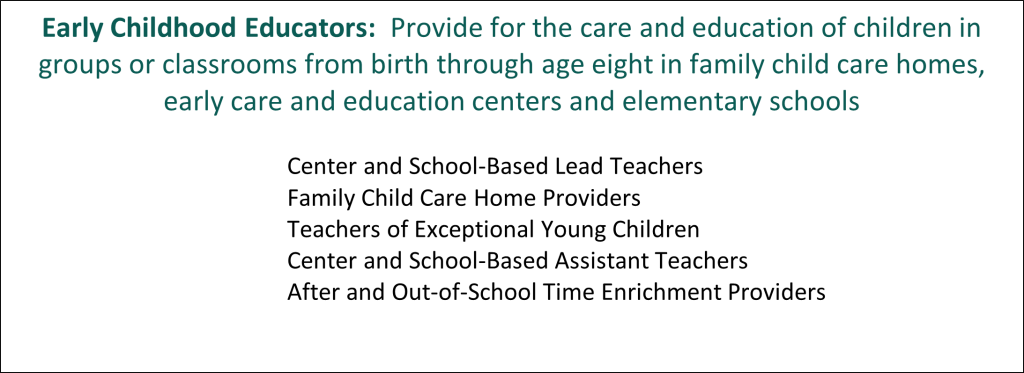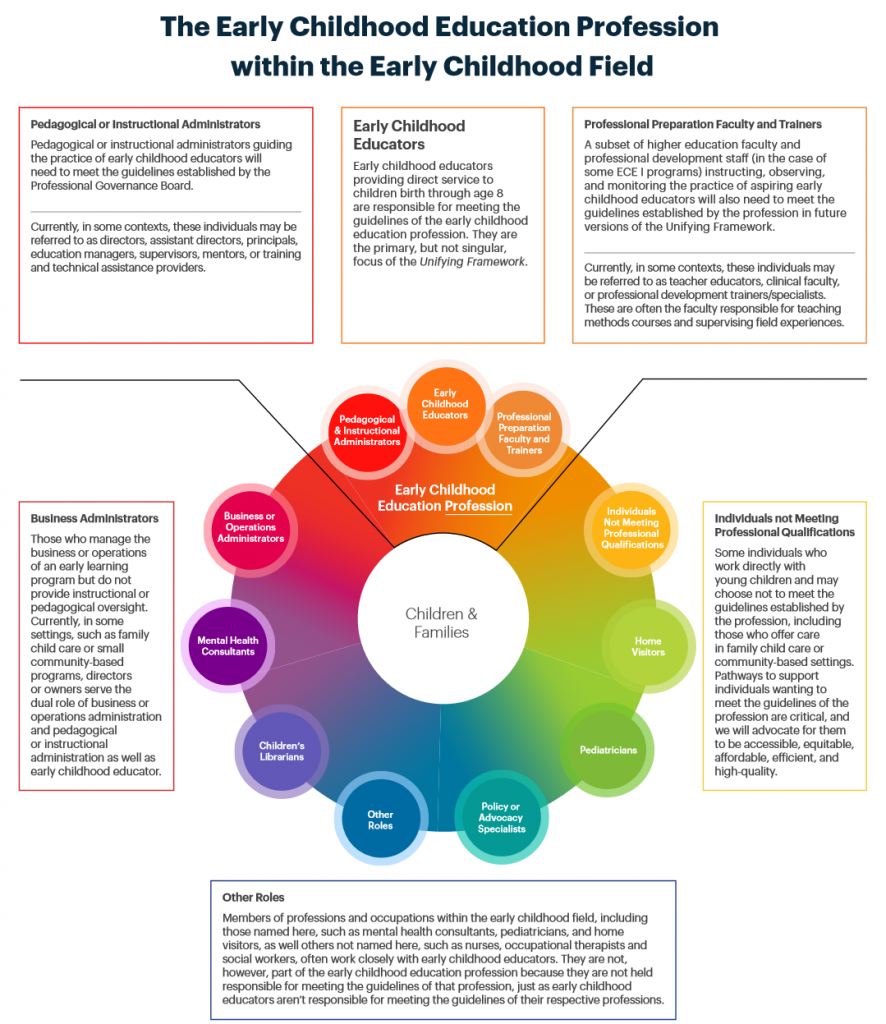Welcome!

- What does it mean to be a part of the Early Childhood Profession in North Carolina today?
- What are the different roles Early Childhood Professionals carry out in the community for young children birth through age 8?
- Where do Early Childhood Professionals work?
- What do Early Childhood Professionals need to know and be able to do and what supports their professional growth?
The Early Childhood Education Professional
Being a professional is hard work. It requires personal commitment, lifelong learning, and a drive for continuous improvement. It means being recognized for your achievements and progressively compensated for your knowledge and skills. Professionals in any field constantly seek new ideas, strategies and techniques, collaborate and learn with their peers, and move forward with client feedback2,4,11. High standards of professionalism are even more important for our field due to the crucial brain development that occurs during the earliest years of development9.
Being a part of the Early Childhood Education Profession means showing commitment and desire to contribute to the field through taking ourselves seriously by valuing our education, experience and professional growth each year. Because our work is so vital to the health and well-being of communities, our sense of professionalism is crucial to what we do. Practitioners in the field of Early Childhood Education are encouraged to set personal and professional goals, plan our own professional development, join and participate in professional associations, accept support, mentor peers and educate the community about the needs of children and families9,10.
Early Childhood Education Professionals serve children, families and communities all at once. The work of educating and caring for young children impacts every level of our lives together as a society4,11. Early Childhood Education Professionals can be found teaching in full-day licensed child care centers through third grade public and private school classrooms, providing for the essential care and education of children before, during and after school hours while their parents and caregivers work or go to school. Early Childhood Education Professionals are successful child care center directors, public school administrators, university professors, and coaches and mentors. We work in schools, child care centers, homes, churches, community colleges, universities, and nonprofit organizations – and we make a difference3.
The North Carolina Early Childhood System has a long and successful history and is studied by researchers, policy analysts and other state governments across the country. North Carolina was one of the first states to implement a licensing requirement for early care and education environments and create comprehensive support services for Early Childhood Education Professionals such as the Smart Start funding stream and the NC CCR&R Council. North Carolina also has one of the country’s first, most successful and longest running quality rating improvement systems (QRIS) for early care and education1. The North Carolina Institute for Child Development Professionals (the Institute) has held an important role throughout our state’s child care and early childhood education history3.
A Unifying Framework for NC’s Early Childhood Education Profession
As North Carolina’s convening organization for the state’s Early Childhood Professional Development (ECPD) System, the Institute is committed to advancing the adoption of The Unifying Framework for the Early Childhood Education Profession (the Framework) published in March 20209. The Institute promotes the use of the categories, descriptions, recommended competencies and education pathways for the Early Childhood Education Profession designed by the Power to the Profession Taskforce.
The multi-organization Power to the Profession Task Force worked collaboratively for three years to develop a field-driven framework to accurately describe and define three progressive levels of professionals who work directly with children in the field of Early Childhood Education. Similar to other human service fields such as the Nursing profession, the Framework creates clear definitions of career roles and responsibilities: Early Childhood Educator I, II and III9.
- Early Childhood Educator I (ECE I) professionals are prepared to assist ECE II and ECE III in implementing and maintaining high-quality environments for children and have at least a 120-hour professional certificate such as a Child Development Associate (CDA)7,9.
- Early Childhood Educator II (ECE II) professionals are prepared to develop and maintain high-quality environments for children and recommended to have at least a two-year degree such as an Associate’s degree in Early Childhood Education9.
- Early Childhood Educator III (ECE III) professionals are prepared to guide the development of environments for children as well as lead and mentor ECE I and ECE II. The Framework recommends that these professionals hold at least a four-year degree, such as a Bachelor’s degree in Early Childhood Education9.
The Institute aligns its conversation on the professional development for people working in the Early Childhood Education Profession with this groundbreaking national work to elevate the field and the essential service its professionals provide for our families and communities in North Carolina.

Early Childhood Educators are at the center of the Framework in the Early Childhood Education Profession. The work of educating and caring for young children in any setting outside of their homes, holds a “primary, but not singular”9 position within the Framework. As a field, organizations and individuals collectively recognize that the professionals who carry out the practices that directly foster young children’s healthy development and early learning are incredibly important2,4,9,11. Early Childhood Educators are the heart of the profession.

Many other Early Childhood Education Professionals work hard to support, teach, guide, provide accountability, and empower Early Childhood Educators as we collectively engage in continuous improvement for the field.
Pedagogical and Instructional Administrators share common goals to guide, develop, support and empower Early Childhood Educators in their daily practice. As mentors, coaches, and consultants, administrators, managers, and directors, Pedagogical and Instructional Administrators have the knowledge, skills and experience to provide support to working professionals on the job9. Licensing consultants for the NC Division of Child Development and Early Education (NC DCDEE), Early Childhood Education Administrators and Instructional Coaches for NC Department of Public Instruction, Quality Improvement Specialists for North Carolina’s Smart Start Partners (Smart Start) and local Child Care Resource and Referral (CCR&R) agencies are examples of professionals working in this sector1,3.

Professional Preparation Faculty and Trainers train and educate both pre-service and in-service Early Childhood Educators in preparation for their entry into the Early Childhood Education Profession and provide vital continuing education along their career pathway. Community college system instructors, public and private four-year university faculty, and ongoing professional development providers or trainers who work for organizations such as the North Carolina Division of Child Development and Early Education, North Carolina’s Smart Start Partners and Child Care Resource and Referral agencies work in conjunction to realize North Carolina’s ECPD system and support both pre-service and in-service professionals in building their knowledge base in alignment with the Framework’s Professional Competencies1,3,10.

Becoming an Early Childhood Education Professional
Professional Standards and Competencies: In accordance with the Framework, the Power to the Profession Taskforce developed the Professional Standards and Competencies for Early Childhood Educators9,10. In combination with formal education and professional development, each Early Childhood Educator level is encouraged to meet six professional standards and competencies:
- Standard One – Child Development and Learning in Context
- Standard Two – Family-Teacher Partnerships and Community Connections
- Standard Three – Child Observation, Documentation and Assessment
- Standard Four – Developmentally, Culturally and Linguistically Appropriate Teaching Practices
- Standard Five – Knowledge, Application and Integration of Academic Content in the Early Childhood Curriculum
- Standard Six – Professionalism as an Early Childhood Educator9
Code of Ethical Conduct- An essential companion document to the Framework and the Professional Standards and Competencies for Early Childhood Educators is the NAEYC Code of Ethical Conduct and Statement of Commitment (the Code)6,9,10. The Code offers Early Childhood Education Professionals important shared principles and guidelines to use in our practice with children, families and one another6.
NC Early Educator Certification (EEC) & Endorsements– The NC Early Educator Certification (EEC) system was developed in response to interests by the field in developing an individually-held, portable form of certification that would mirror professional certifications of other fields and serve as a step in the career pathway for NC early childhood professionals working directly with or on the behalf of children ages birth to twelve in out of home settings.
EEC recognizes all those working directly with young children in regulated settings, on the behalf of children in support or education roles or intending to work in NC with the birth to twelve population in out of home settings — regardless of role, place of employment or geographic location.
Getting certified in NC is considered an important step towards professionalism in the Early Childhood Profession and recognizes an individual’s level of education in the profession. Certified Early Educators may also obtain additional EEC Endorsements which recognize specific knowledge or skills by role within the profession (ex. administrator endorsement, professional development endorsement, technical assistance endorsement).
Professional Associations and Memberships– There are an abundance of early childhood organizations and associations that an early childhood professional can become involved with both locally, at a state level (NC) or even nationally. Professional organizations/associations support early childhood professionals in their professional development and career growth. They ensure that professionals remain current on issues happening in the field and allow them to get involved, develop leadership and advocate for change.
Early Childhood Career Roles in NC
Learn more about the following early childhood education professional roles in NC:
Early Childhood Educators (Teachers)
Early Childhood Teachers of Exceptional Young Children
Early Childhood Directors/Administrators
Early Childhood Technical Assistance Providers
Early Childhood System Regulators (Licensing Consultants) & Assessors
Early Childhood Professional Development Providers/Trainers
Early Childhood Higher Education Faculty
You can also learn more by accessing the Careers in Early Childhood- A North Carolina Directory published by Child Care Services Association or utilizing the Early Childhood Education Career Survey provided online by the New York Early Childhood Professional Development Institute.
References
1. Institute of Medicine (IOM) and National Research Council (NRC). (2015).
Transforming the workforce for children birth through age 8: A unifying foundation. Washington,DC: The National Academies Press.
2. Lower, J.K., Porterfield, M.L., Cassidy, D.J. (2012). The north carolina professional development framework for the early childhood and out-of-school time systems: Results and actions from regional and state planning. North Carolina Division of Child Development and Early Education. Retrieved from https://ncchildcare.ncdhhs.gov/Portals/0/documents/pdf/P/Professional_Development_Framework-DCDEE.pdf
3. NAEYC. (2016). Build it better: Indicators of progress to support integrated professional development systems. Retrieved from https://www.naeyc.org/sites/default/files/globally-shared/downloads/PDFs/our-work/public-policy-advocacy/Build%20It%20Better_For%20Web.pdf
4. NAEYC. (2011 ). Code of ethical conduct and statement of commitment. https://www.naeyc.org/sites/default/files/globally-shared/downloads/PDFs/resources/position-statements/Ethics%20Position%20Statement2011_09202013update.pdf
5. NAEYC and Council for Professional Recognition. (2012). Suggested relationship between the CDA formal child care education requirement and NAEYC standards for professional preparation programs. https://www.cdacouncil.org/storage/documents/Downloadable_Forms/CDA_and_NAEYC_Standards_Relationship.pdf
6. North Carolina Institute for Child Development Professionals. (2017). NC early care and education professional certification scale. Retrieved from https://ncicdp.org/documents/EEC_ECE_Scale.pdf
7. Power to the Profession. (2020). Unifying framework for the early childhood education profession. Retrieved from http://powertotheprofession.org/wp-content/uploads/2020/03/Power-to-Profession-Framework-03312020-web.pdf
8. Power to the Profession. (2020). Professional standards and competencies for early childhood educators. Retrieved from https://www.naeyc.org/sites/default/files/globally-shared/downloads/PDFs/resources/position-statements/professional_standards_and_competencies_for_early_childhood_educators.pdf
9. Think Babies™. (2021). NC2021-2025 Prenatal to Age 3 Policy Priorities for Infants, Toddlers, and their Families. Retrieved from https://ncearlyeducationcoalition.org/wp-content/uploads/2021/04/IT-Workforce-Compensation-Fact-Sheet-April-2021.pdf




